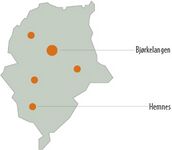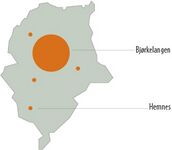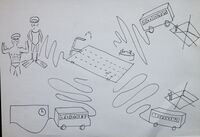LED 2016 Group C Landscape Democracy Challenge 1
==
Centralization politics... and a swimming pool ==
| Place name | Bjørkelangen | |
| Location | Aurskog-Høland | |
| Country | Norway | |
| Author(s) | Helene Hoel Oppegaard | |

| ||
Rationale: Why have you chosen this case for the landscape and democracy seminar?
My municipality is called Aurskog-Høland. I grew up in a small town to the south of the municipality. My town is called Hemnes, and the organizational center is called Bjørkelangen. Hemnes and the other towns in the south of the municipality are threatened by depopulation and centralization. All the commitment and investment are made in Bjørkelangen (north of the municipality), and I think “the new swimming pool” and its centralized location signal a challenge for landscapers and city planners. The Swimming pool, is in many ways a symbol on the centralization politics, and many fear that all the investment in Bjørkelangen will destroy the existing town structure in the municipality. The investment in a bigger swimming pool split my municipality, and creates a need for new democratically processes and evaluation.
Representation of your observations
- you are basically free to use one or a mix of different presentation techniques
- possibilities are: analytical drawings, graphical representations, collages, video clips, comic/graphic novel, written essay/visual essay
- please add any visual material to the gallery, videos can be placed below, you may add text as you like
Reflection
What are the major challenges for changing the situation?
The municipality wants to build a new swimming pool at Bjørkelangen (which it actually not can afford, but that is another story). The swimming pool is supposed to be an offer to school children, sport swimmers, retraining and elderly people in community. The inhabitants living in and nearby Bjørkelangen are positive and enthusiastic about the planned facilities.
All of the schools in the municipality have pools, which supports the swimming lessons on each school. The existing pools also offer the inhabitants bading and swimming opportunities two to three times a week. The inhabitants in the other part of the municipality are rather skeptic, as they fear that the new Swimming hall will be expensive. Many fears that the smaller local pools will be shut down, to afford the maintenance and costs of the new swimming facilities. This will force the school children to travel many miles every week, to get their swimming lessons. This will provide a poorer swimming offer, probably lead to weaker swimmers, and claim a lot of time and money for transport expences. The municipality is split between, the inhabitants of the countryside and the inhabitants who live nearby the new facility (and of course the politicians who dream wants to attract more inhabitants with luxury facilities). The municipality doesn’t have any large amount of swimmers, and in nearby cities there are similar facilities. Therefor it is legit to ask, why use money on a debated swimming hall. When the municipality have little money, and other more precarious needs? Smaller autonomic cells, will lower the transport needs, and the inhabitants could preserve an independent town structure. The newly planned Swimming hall stands as a symbol of centralization politics, and the investment politics in my municipality. The inhabitants of the countryside, wish to preserve the smaller towns with their own autonomy (in some extent), while the politicians and the people living around the municipality center wants focus on developing one bigger center.
What could be a starting point for democractically-based change?
I think this should be decided by all the inhabitants, therefore I think the simplest course of action would be to put this issue through a vote. Still I think a vote insufficient. The swimming pool is just a decision made by a smaller part of my community. The planning system we see today is driven by engaged and resourced people, and I think that only a small part of opinions are included in the decision making, that’s not democratically planning.
Ralph Erskine’s pop-up office in Byker (Newcastle, England), inspired me. Erskine invited all the inhabitant to be a part of the planning process. Erskine’s pop-up office is a good idea, to collect opinions, and make people contribute to their future environment. To meet the users at their arena, and in smaller environments, makes it easier to speak up. In big public meetings, only a small group dare to speak up. We should not have a planning system based on the ones who screams highest. We as planners needs to understand that we are only a tool, to mediate the inhabitant’s needs for their environment. We need to be in contact with the environment, and its users, to understand, and be able to create sustainable communities.
References
- ...
- ....
- ...
- Please make sure that you give proper references of all external resources used.
- Do not use any images of which you do not hold the copyright.
- Please add internet links to other resources if necessary.
About categories: You can add more categories with this tag: "", add your categories



